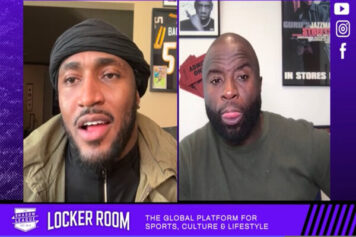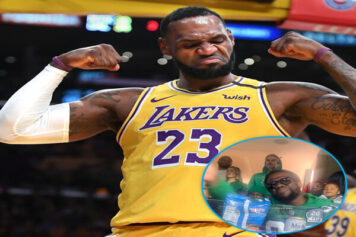Colin Kaepernicks protest of racial inequality in America has been a lightning rod since he knelt during the playing of the national anthem last year.
The media has covered it religiously. Google Colin Kaepernick protest and youll see over four-million links to choose from. Social media is full of posts about it and every NFL Sunday leading up to the Super Bowl seemed to bring a new wrinkle to the story. But, sports and activism is nothing new in America. African-American athletes, especially, have protested, spoken out and demonstrated against social justice issues for over a century.
They were seen as pariahs, Dr. Harry Edwards, the highly respected sociologist and activist who also worked as a consultant to professional sports teams such as the San Francisco 49ers and Golden State Warriors told me. The general sentiment is that we should shut up and be grateful.
Sociologist Harry Edwards on 49ers Colin Kaepernick controversy
San Francisco 49ers quarterback Colin Kaepernick sparked a national debate after refusing to stand during the national anthem in protest of racial inequality. In an interview with James Brown, Dr. Harry Edwards describes how athletes like Kaepernick can frame the debate to move racial discussions forward.
Legendary boxer Jack Johnson was battling for equality at the beginning of the 1900s. After dominating the black boxing circuit, Johnson wanted a crack at World Heavyweight Champion, Jim Jeffries, who refused to fight him.
After Johnson, great African-American athletes such as Jessie Owens, who won four gold medals in the 1936 Berlin Olympics, and boxer Joe Louis, who won the heavyweight title in 1937, would dominate their respective sports. But they struggled for acceptance, simply based on the color of their skin.
“A lot of people believe in superiority, said DeNeen Brown, culture, literature and arts feature writer with the Washington Post said during an interview with me. I believe that race is a social construct that was created to make people feel superior to others.”
In 1947, Jackie Robinson finally broke the barrier and played for the Brooklyn Dodgers in Major League Baseball, it was supposed to mark a moment of acceptance of African-American athletes.
Instead, the 1950s and 1960s brought a new challenge for black athletes, gaining respect. Men such as Bill Russell, Arthur Ashe and Muhammad Ali were allowed to compete, but they werent treated the same as their counterparts.
NBC News – Muhammad Ali on not going to war
undefined
You had a group of black athletes that were saying you owe me dignity and respect, said Dr. Edwards. They wanted to be respected not only as great athletes, but as human beings.
Leading up to the 1968 Olympics in Mexico, Dr. Edwards became the architect of the Olympic Project for Human Rights. The organizations goal was to help eliminate segregation in sports in America, as well as other countries across the world.
The group wanted the International Olympic Committee to meet four conditions, or face a boycott of the games:
1. South Africa and Rhodesia, which were under white-minority rule at the time, be banned from the Olympics.
2. Muhammad Ali be restored as heavyweight champion.
3. Avery Brundage, President of the IOC, to step down.
4. The hiring of more African-American assistant coaches.
None of those things happened, and the boycott fell through, leading to an historic event just days into the games.
In the 200-meter final, American sprinter Tommie Smith won gold, while his counterpart John Carlos took the bronze. On the podium, they each put the Olympic Project for Human Rights badge on their jackets, donned black socks and raised a clenched fist adorned in black gloves during the U.S. National Anthem.
Brundage, who didnt object to Nazi salutes during the 1936 games in Berlin, referred to the protest as the nasty demonstration against the American flag by negroes.
October 16, 1968 – U.S. Olympic Sprinters Protest Racial Inequality
The 1968 Olympic Games in Mexico City may be most remembered not for an athletic accomplishment, but for a silent act of protest. On October 16 of that year, two African American sprinters who placed first and third in the 200-meter dash – Tommie Smith and John Carlos – used their medal ceremony to make a statement.
He ordered Smith and Carlos be suspended from the U.S. team and banned from the Olympic Village. When the U.S. Olympic Committee refused, Brundage threatened to expel the entire track team, which led to Smith and Carlos being sent home.
The whole lesson of 1968 was that when the empire strikes back, theyre going to kill you, said Bob Lipsyte, the author and writer who has worked for ESPN, The New York Times and USA Today. Smith and Carlos were stripped of their medals, some media outlets referred compared them to Nazis, and both men faced death threats for years.
Brent Musberger, who worked for the now-defunct Chicago American newspaper at the time and later for CBS and ABC, blasted Smith and Carlos upon their return, calling them, black-skinned storm troopers, holding aloft their black-gloved hands during the National Anthem.
Fmr. NBA star pushes back on Kaepernick’s critics
Kareem Abdul-Jabbar calls San Francisco Quarterback Colin Kaepernick’s refusal to stand up for the national anthem ‘patriotic.’
Musberger went on to write:
They sprinkled their symbolism with black track shoes and black scarfs and black power medals. It’s destined to go down as the most unsubtle demonstration in the history of protest.
But you’ve got to give Smith and Carlos credit for one thing. They knew how to deliver whatever it was they were trying to deliver on international television, thus insuring maximum embarrassment for the country that is picking up the tab for their room and board here in Mexico City. One gets a little tired of having the United States run down by athletes who are enjoying themselves at the expense of their country.
Musberger didnt understand the athletes message, just as today the meaning of Kaepernicks protest is lost in debates about patriotism and respect for the flag and members of the armed forces.
Smith and Carlos, were really just protesting racism and poverty in the country, said Brown. Just like the NFL players, Smith and Carlos said they weren’t protesting the flag or the military.”
Similar to Smith and Carlos, Kaepernick says he has also faced death threats.
They [Smith and Carlos] had to scramble for employment, said Lipsyte. They didnt get the endorsements or recognition they deserved as Olympic medalists.
Seahawks Michael Bennett: I’ll protest anthem until we’re equal
NFL star Michael Bennett of the Seattle Seahawks speaks to CNN’s Jake Tapper about his decision to sit during the national anthem in protest of the violence in Charlottesville, Virginia.
Kaepernick is now in the same boat. Every NFL team carries two quarterbacks, meaning there are at least 64 jobs available in the league, yet the man who led the San Francisco 49ers to the Super Bowl in 2013 and has better career numbers than most hasnt been offered a contract.
This isnt about skill or wins-and-losses, its about disrupting the establishment.
Theres never been a protest movement where mainstream America has stood up and said Amen we agree with this protest movement, said Dr. Edwards. Those movements disturb the status-quo, and it is the status-quo because that is how mainstream America has constructed it, and wants it.
Steve Wyche of the NFL Network originally broke the story that Kaepernick was kneeling. He asked the quarterback if he knew what the ramifications of his decision could be.
He knew that there was going to be backlash and he knew it was going to be controversial, Wyche told me. He said he was willing to sacrifice. If he lost his endorsements, if he lost his career, as long he stood for something.
Smith, Carlos and Kaepernick all wanted the same thing when they began their protests. Equality. After seeing unarmed African-American men, such as Alton Sterling and Michael Brown killed by police officers, Kaepernick said, it would be selfish on my part to look away.
Yet, much like 50 years ago, those in a position of power, such as Brundage, cant seem to understand that.
Bob McNair, owner of the Houston Texans, exemplified the exact thinking that Smith, Carlos and Kaepernick were tired of at a recent meeting between the league and its players.
We cant have the inmates running the prison, McNair said during the meeting. It was a tone-deaf statement that some compared to the mindset of a slave owner.
“Sometimes the NFL and other sports leagues replicate how slavery was constructed in this country, said Brown. They can tell workers how to live, what to say and what to not say.”
It is this sentiment that has caused the rise of the athlete-activist. It hasnt just been NFL players either. The NBA, WNBA and Major League Baseball have all had individuals speak out, or protest on social-justice issues.
Dr. Edwards believes its because African-American politicians have fallen victim to the game. He thinks the political world only speaks out when individuals are in line for some sort of personal gain.
If LeBron James speaks up, if Steph Curry speaks up, if Colin Kaepernick speaks up, if Michael Bennett speaks up, people in the community listen, he said. The people walking in the footsteps of the last civil-rights leader to get a Nobel Prize, Dr. King, you better look for someone in gym shoes or football cleats.
Smith, Carlos and Kaepernick were simply exercising their right to free speech, and all three men have been vilified for doing so.
Kaepernick has been called out by the president, commentators, including former NFL quartberack Boomer Esiason, as well as other black athletes, like former NFL great Jim Brown. The reaction to Kaepernicks taking a knee is similar to what Smith and Carlos faced after their demonstration.
Yet, history treats Smith and Carlos kindly. There is a statue of the gentleman outside San Jose State University, commemorating the 68 protest.
That wouldve been hard to imaging 50-years ago, but their demonstration started a conversation that needed to be had, similar to what Kaepernicks kneeling has done today.
Kaepernick was named GQ Magazines 2017 Citizen of the Year, and as hard as it is to fathom, one day we might see him honored with a statue as well.
***
Jas Kang is a student at the University of Southern California’s Annenberg School For Communication and Journalism



